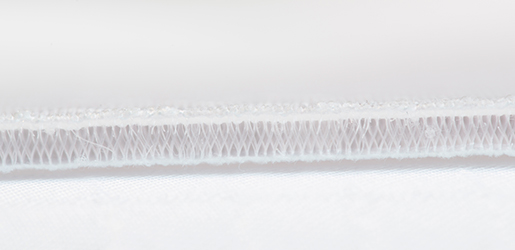Microclimat test and friction test Skincair 3D medical fitted sheet
Skincair medical fitted bed sheets are now widely used in practice and internally evaluated in pilots for further use by many nursing home and care institutions that start with the product in nursing practice, as well at various rehabilitation institutions and home care organizations in the Netherlands. The users in those healthcare institutions who benefit from Skincair, such as people with reduced mobility, risk of skin disorders and with neurological, motor and other disorders, have extensively tested Skincair together with healthcare providers in recent years and experienced many advantages: much more freedom of movement and reduced dependence on care, less chance of skin problems occurring, less trouble with heat and perspiration at night, more comfortable and relaxed sleep and relief from care in time and physical strain.
Skincair has also been tested in home care and in the home situation by test groups consisting of many home care clients (of Buurtzorg, BrabantZorg and Thebe), persons with psoriasis, Parkinson’s disease, spinal cord injury, CVA, MS, COPD and people recovering from medical treatments and operations. These tests showed that many users experience much less discomfort from their medical problem or condition, can move more easily in bed, get in and out of bed with less effort, are significantly less bothered by perspiration and heat and therefore sleep better and more comfortably.






Laboratory Tests Research Results Skincair
Proven benefits of the Skincair 3D medical fitted sheet by test users are Skincair’s unique core properties, being a low friction and microclimate control function. These two factors are now mentioned by the EPUAP (European Pressure Ulcer Advisory Panel), in the 2014 and 2019 guidelines for the prevention and healing of skin problems and pressure ulcers, as factors to pay increasingly attention to in the healthcare and home care environments.
The advice of the guidelines is not to use stiff, wrinkly cotton sheets, but bed linen of synthetic composition that gives lower friction and shear forces and is able to better control the microclimate near the skin (humidity and temperature).
Both properties of Skincair have been tested by two different independent advanced German textile research institutes: ITV Denkendorf and the Hohenstein Institute. They tested the product on the two most important properties:
– Smoothness and friction due to the ability to turn and move better in bed and the influence on the physical load during care activities.
– Water vapor transport capability related to ventilation and removal of perspiration from the skin to the environment when sleeping.
Friction tests at ITV Denkendorf, a renowned textile testing and research institute in southern Germany, show that the top of the satin-soft Skincair is smoother than cotton bed linen. Both in dry and wet condition. The microclimate tests of the Hohenstein Institute show that Skincair’s 3D textile material is much better able to absorb, evaporate and dissipate moisture and water vapour. It acts as a highly ventilating, breathable layer for the skin of nursing home residents and patients at home and in hospitals. See: LINK to ABSTRACT scientific research
Friction tests at ITV Denkendorf, a renowned textile testing and research institute in southern Germany, show that the top of the satin-soft Skincair is smoother than cotton bed linen. Both in dry and wet condition. The microclimate tests of the Hohenstein Institute show that Skincair’s 3D textile material is much better able to absorb, evaporate and dissipate moisture and water vapour. It acts as a highly ventilating, breathable layer for the skin of nursing home residents and patients at home and in hospitals.
